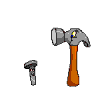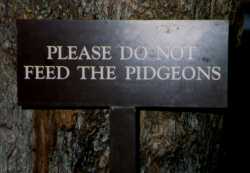

![]()
Revised 7-14-13
Writing Tip: The importance
of comprehensive cross-referencing will be covered
elsewhere.
"The rule which forbids ending a sentence with a preposition
Eye
halve a
spelling
checker
Eye
strike a
key and
type a
whirred
As
soon as
a mist
ache is
maid Eye
have run
this
poem
threw it
It has come to our considered attention that in a large majority of cases, far too many people use a great deal more words than is absolutely necessary when engaged in the practice of writing sentences.
A few more rules for writing: The passive voice should never be used. SAVE A LIFE... USE A COMMA! Let's eat Grandma. Let's eat, Grandma.
on the blackboard and directed the students to punctuate it correctly.
The men wrote:
The women wrote:
 A copyeditor's work is never done. Always working!
A copyeditor's work is never done. Always working!
is the kind of nonsense up with which I will not put."
—Winston Churchill
This Has Been Spell Czeched
It
came
with my
pea sea
It
plainly
Marc's
four my
revue
Miss
steaks
eye
Cannes
knot
sea.
And
weight
four it
two say
Weather
eye am
wrong
oar
write
It
shows me
strait a
weigh.
It nose
bee fore
two long
And
eye can
put the
error
rite
Its rare
lea ever
wrong.
I am
shore
your
pleased
two no
Its
letter
perfect
awl the
weigh
My
checker
tolled
me sew.
HOW TO WRITE
ENGLISH
If you proofread and edit your work, you can find that by rereading and editing, a great deal of redundant repetition can be removed and eliminated by rereading, proofreading, and editing, so you should reread and edit to remove and eliminate these redundant repetitions.
A writer must not shift your point of view. If the writer is considerate of the reader, he won't have a problem with ambiguous sentences. If a dependent clause precedes an independent clause put a comma after the dependent clause. But avoid commas, that are not necessary, and don't overuse exclamation marks!!!
In statements involving two word phrases, make an all out effort to use hyphens, but make sure you hyp-henate properly.
Verbs has to agree with their subjects, and the adverb always follows the verb.
This sentence no verb. Which is not a complete sentence, but merely a subordinate clause.
Avoid colloquial stuff, and trendy locutions that sound flaky. Also, always avoid all awkward and affected alliteration.
Unqualified superlatives are the worst of all. Beware of and eschew pompous prolixity, and avoid the utilization of enlarged words when shortened ones will suffice. Avoidification of neologisms strengthenifies your prosification. Avoid using sesquipedalian words. It is not resultful to transform one part of speech into another by prefixing, suffixing, or other alterings. Perform a functional iterative analysis on your work to root out third generation transitional buzz words. The de facto use of foreign phrases vis-a-vis plain English in your written tete-a-tetes is not
apropros.
Do not put statements in the negative form.
The writer must not shift your point of view.
And don't start a sentence with a conjunction.
DO NOT overuse exclamation points and all caps to emphasize!!!
Place pronouns as closely as possible, especially in long sentences, as of
10 or more words, to their antecedents.
If any word is improper at the end of a sentence, a linking verb is.
Everyone should be careful to use a singular pronoun with singular nouns in their writing.
Always pick on the correct idiom.
Never use a preposition to end a sentence with.
Don't verb nouns.
Don't never use no double negatives.
Each pronoun agrees with their antecedent.
When dangling, watch your participles.
Eliminate commas, that are, not necessary. Parenthetical words however should be enclosed in commas.
About those sentence fragments. Remember subject, verb, object.
Try to not ever split infinitives.
Use the apostrophe in it's proper place and omit it when its not needed.
Correct speling is esential.
Between you and I, case is important.
Verbs has to agree with their antecedents.
When composing informal documents, employ the vernacular.
Eschew ampersands & abbrevs, etc...
Parenthetical remarks (however relevant) are (usually) unnecessary.
Contractions aren't necessary and shouldn't be used.
In all cases, you should never generalize.
Eliminate quotations. As Ralph Waldo Emerson once said: "I hate quotations.
Tell me what you know."
Avoid the use of dyed-in-the-wool cliches like the plague; they are old hat.
Comparisons are as bad as cliches.
Don't be redundant; don't use more words than necessary; it's highly superfluous.
Usually, you should be more or less specific.
Understatement is always the absolute best way to put forth earth-shaking ideas.
Exaggeration is a billion times worse than understatement.
Simplify! How? Eliminate one-word sentences.
Analogies in writing are like feathers on a snake.
Go around the barn at high noon to avoid colloquialisms, ya know?
Even if a mixed metaphor sings, it should be derailed. Who needs rhetorical questions?
Use words correctly, irregardless of how others use them.
If you've heard it once, you've heard it a thousand times: Resist hyperbole; not one writer in a million can use it correctly.
Puns are for children, not groan readers.
Run on sentences cause all sorts of problems for readers and people should never use them and must try to write better and divide their sentences.
Use the semicolon properly, always use it where it is appropriate; and never where it isn't.
Hyphenate between sy-llables and avoid un-necessary hyphens.
Use hyphens in compound-words, not just where two-words are related.
Be carefully to use adjectives and adverbs correct.
It is incumbent on us to eschew archaisms.
Steer clear of incorrect forms of verbs that have snuck in the language.
Don't string too many prepositional phrases together unless you are walking through the valley of the shadow of death.
"Avoid overuse of 'quotation' marks.'"
Never leave a transitive verb just lay there without an object.
Only Proper Nouns should be capitalized.
a sentence should begin with a capital letter and end with punctuation In letters compositions reports and things like that use commas to keep a string of items apart.
Vary your words variously so as to use various words.
Good writers do not use one verb tense in one part of a sentence, and then have switched to a different tense in the next.
Always be looking out for "be" verbs, for they are supplying verbiage all scholars are discouraging.
Use delightful but irrelevant extra adjectives and adverbs with sparing and parsimonious infrequency, for they unnecessarily bloat your otherwise perfect sentence.
Bee careful two use the write homonym.
Beware of malapropisms. They are a communist submersive plot.
Join clauses good like a conjunction should.
Continuity of thought, logical development and smooth transitions are important. Never leave the reader guessing.
Sentences without verbs--bad idea.
Use parallel structure when you write and in speaking.
Proofread carefully to see if you words out.
Writing Tip: If any word is
improper at the end of a sentence, a linking verb is.
POINTS OF VIEW
An English professor wrote the words:
![]()
![]()
![]()
Q. — How many MANAGING EDITORS does it take to screw
in a lightbulb?
A. — You were supposed to have changed that lightbulb
last week!
Q. — How many WRITERS does it take to screw in a
lightbulb?
A. — But why do we have to CHANGE the bulb?
Q. — How many ART DIRECTORS does it take to screw in a
lightbulb?
A. — Does it HAVE to be a lightbulb?
Q. — How many COPY EDITORS does it take to screw in a
lightbulb?
A. — The last time this question was asked, it involved art
directors. Is the difference intentional? Seems inconsistent.
Q. — How many MARKETING DIRECTORS does it take to
screw in a lightbulb?
A. — It isn't too late to make this neon instead, is it?
Q. — How many PUBLISHERS does it take to screw in a
lightbulb?
A. — Three. One to screw it in, and two to hold down the
author.
Q. — How many SALES DIRECTORS does it take to screw
in a lightbulb?
A. — (pause) I get it! This is one of those lightbulb jokes,
right?
The sign on the left is at Amtrak's LA station. Apparently, it's okay to feed the pigeons.



Humphrey took this photo at Morro Rock in Morro Bay, CA, and I asked
him why on earth he wanted a picture of
that rusty old thing. His answer?
"Because it's part of the old-buoy network."
 Not even if I'm in my
boat?
Not even if I'm in my
boat?
Sign on a boat ramp at
Indian Valley Reservoir in Lake County, CA, sent by: Richard Kraft
Fairfield, CA
Dungeness Cemetery
Property available.
Scott's Fruit & RV
(seen from I-5 in Washington State)
El Costa-Lotta Rd
Highway 504, Washington State
Ill Eagle Fireworks Stand
Barber & Gunshop
(Shepherd, TX)
Beer
Worms
(near Ochopee, Florida)
Live parking only
(Parker WLR, MA)
Let 'er drift
Use min power
Let 'er cool
Truckers
Upgrade ahead
Crank up
Brake check area
Take ten
Let 'em cool
Dictionary.com
Chicago Manual of Style FAQs
Virtual Reference Desk
Library Spot
English Grammar (Hughes)
Grammar Lady
